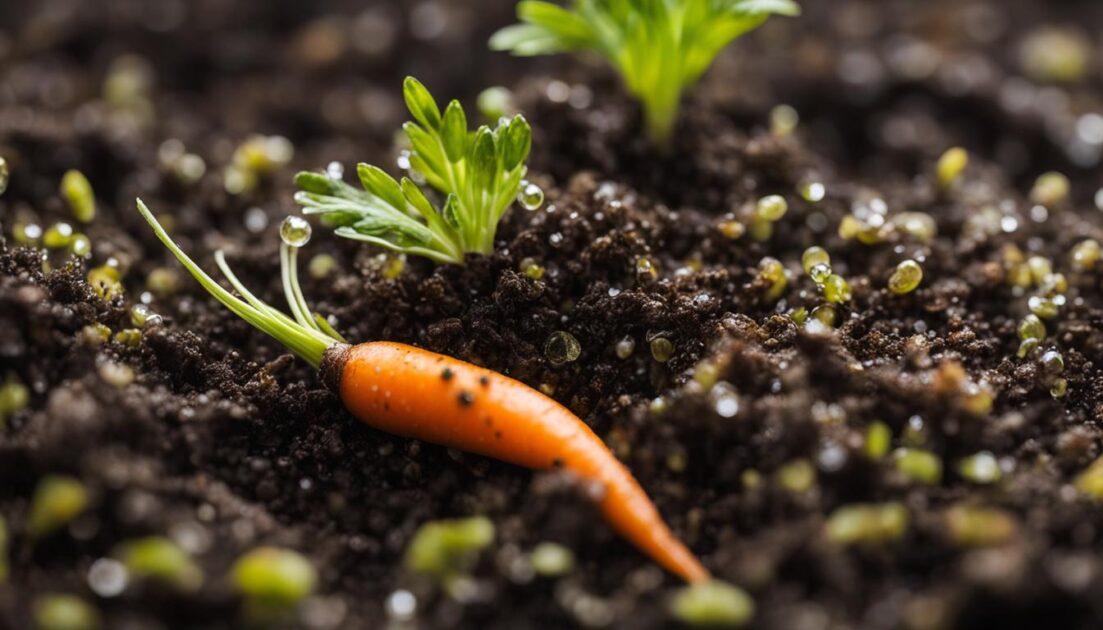Carrot seed oil is a versatile essential oil that offers a range of benefits for both skincare and haircare. Derived from the seeds of the Daucus carota plant, this oil has been used for centuries in various cultures for its healing and rejuvenating properties.
When it comes to skincare, carrot seed oil is known for its ability to repair skin damage, improve skin tone, and provide relief from skin conditions such as eczema. Its antifungal and antibacterial properties make it an excellent choice for promoting healthy skin. Additionally, carrot seed oil can be nourishing for the scalp and can promote healthy hair growth.
Using carrot seed oil is quite simple. It is typically diluted with a carrier oil, such as coconut oil or grapeseed oil, before applying it to the skin or hair. It can be incorporated into creams, serums, or other skincare products, or added to shampoo and conditioner for a nourishing haircare routine.
While carrot seed oil offers many benefits, it is important to be cautious when using it. It is recommended to perform a patch test before applying it to a larger area of the skin and to consult a doctor before using it for any medicinal purposes.
Key Takeaways:
- Carrot seed oil has numerous uses and benefits for both skincare and haircare.
- It is known for its ability to repair skin damage, improve skin tone, and relieve skin conditions such as eczema.
- When using carrot seed oil, it should be diluted with a carrier oil and applied topically.
- Perform a patch test before using carrot seed oil on a larger area of the skin.
- Consult a doctor before using carrot seed oil for any medicinal purposes.
History and Origin

Carrot seed oil has a rich history that spans across different cultures and time periods, showcasing its enduring popularity and remarkable properties. Ancient civilizations such as the Greeks, Romans, Egyptians, French, and Indians recognized the benefits of this unique oil.
Carrot seed oil was traditionally used for its soothing effects on inflammation and its ability to aid in digestion. The origins of this oil can be traced back to the dried seeds of the Daucus carota plant, also known as Wild Carrot or “Queen Anne’s Lace.” It is important to note that carrot seed oil is distinct from carrot carrier oil or carrot seed carrier oil, which are infused oils derived from different parts of the plant.
The production process of carrot seed oil involves steam distillation, meaning it is extracted from the seeds using heat and water vapor to capture its potent properties. This method ensures that the oil retains its natural benefits and fragrance.
The fascinating history and origin of carrot seed oil serve as a testament to its enduring value and effectiveness in various applications.
| Historical Period | Significance |
|---|---|
| Ancient Greeks | Recognized the soothing effects of carrot seed oil on inflammation. |
| Romans | Appreciated the digestive benefits of carrot seed oil. |
| Egyptians | Valued carrot seed oil for its versatility in skincare and wellness. |
| French | Used carrot seed oil for various beauty and culinary purposes. |
| Indians | Incorporated carrot seed oil into their traditional practices for holistic well-being. |
Properties and Key Components

Carrot seed oil is packed with a unique combination of key components that contribute to its impressive properties and versatile uses.
Key Components of Carrot Seed Oil
| Component | Function |
|---|---|
| Carotol | Stimulates circulation, brain function, and nerve function |
| Daucene | Has a soothing and grounding effect, reducing fatigue, weakness, anxiety, and stress |
| Beta-bisabolene | Offers antibacterial, antifungal, and anti-inflammatory properties |
| Daucol | Acts as an antioxidant, helping to repair skin damage and tighten the skin |
The warm, earthy, woody, and herbaceous scent of carrot seed oil enhances its therapeutic benefits. It can be inhaled to soothe sore throats, ease hiccups, and potentially offer gastroprotective properties.
With its antibacterial and antifungal properties, carrot seed oil can help maintain healthy skin and combat infections. When applied topically, it repairs damage, tones muscles and tissues, and tightens the skin.
The unique combination of key components in carrot seed oil makes it a versatile and valuable addition to skincare, wellness, and aromatherapy routines.
Discover more about the benefits and applications of carrot seed oil in the following section.
Culinary and Personal Products

Carrot seed oil has versatile uses in both culinary and personal care products. While it adds a delightful flavor to various dishes, it also offers numerous benefits for skin and hair health. Let’s explore the culinary uses of carrot seed oil as well as the personal products that harness its potent properties.
Culinary Uses of Carrot Seed Oil
Carrot seed oil can be infused into culinary oils like olive oil or coconut oil, providing a unique and aromatic twist to your cooking. When using it in your recipes, be sure to use it as a flavor enhancer rather than relying on it solely as a sunscreen. It’s important to note that carrot seed oil does not have any proven evidence to protect against sunburns, sun damage, or skin cancer. So, while it adds a lovely taste to dishes, it’s essential to use traditional sun protection methods to safeguard your skin.
Personal Products with Carrot Seed Oil
In the realm of personal care products, carrot seed oil finds its way into a wide range of formulations. You’ll commonly find it in face wash, facial oil, serum, and dark spot treatments. Thanks to its antifungal and antibacterial properties, carrot seed oil can help address skin infections like eczema, providing gentle and nourishing relief. To promote a healthy scalp, some individuals also incorporate carrot seed oil into their shampoo and conditioner routines, enjoying the nourishment it provides.
Carrot seed oil’s presence in personal care products showcases its versatility and efficacy in addressing various skin concerns. By harnessing the power of this natural ingredient, manufacturers create products that promote healthy, radiant skin.
| Culinary Uses | Personal Products |
|---|---|
| Infused into culinary oils for flavor | Face wash |
| Facial oil | |
| Serum | |
| Dark spot treatments | |
| Shampoo and conditioner |
As demonstrated in the table above, carrot seed oil serves a dual purpose, enhancing both culinary delights and personal care experiences. Its diverse applications make it a versatile ingredient that caters to a wide range of preferences and needs.
Other Topical Uses

Carrot seed oil offers a versatile range of topical uses that go beyond just skincare. With its antioxidant properties and ability to stimulate new tissue and skin growth, it has become a popular ingredient in anti-aging products. The oil helps to even out skin tone and relieve hyperpigmentation, leaving the skin looking youthful and rejuvenated.
In addition to its skincare benefits, carrot seed oil has gained popularity in aromatherapy due to its soothing and calming effects. The warm, earthy scent promotes relaxation and can help alleviate stress and anxiety. Incorporate carrot seed oil into your aromatherapy routine by using it in diffusers or adding it to bath salts for a spa-like experience.
Beyond its cosmetic and aromatherapy applications, carrot seed oil also possesses anti-inflammatory properties. When applied topically, it can help reduce inflammation and provide relief for various conditions. Whether you’re dealing with muscle soreness, joint pain, or other forms of inflammation, carrot seed oil may offer natural support.
Overall, carrot seed oil’s topical uses extend far beyond skincare. From anti-aging benefits to aromatherapy and inflammation relief, this versatile oil provides a holistic approach to wellness and self-care.
Key Takeaways:
- Carrot seed oil is commonly used in anti-aging skincare products due to its antioxidant properties and ability to promote new tissue and skin growth.
- Aromatherapy enthusiasts can enjoy the soothing and calming effects of carrot seed oil by adding it to diffusers or bath salts.
- The anti-inflammatory properties of carrot seed oil make it a potential natural remedy for various forms of inflammation, offering relief and support.
| Topical Uses of Carrot Seed Oil | Benefits |
|---|---|
| Anti-aging skincare | Promotes skin rejuvenation and even skin tone |
| Aromatherapy | Soothes and calms the mind, promotes relaxation |
| Inflammation relief | Reduces inflammation and provides natural support |
Benefits and Application

Carrot seed oil offers a wide range of benefits for skincare and haircare. Its nourishing properties make it a popular choice for those looking to improve the health and appearance of their skin and hair. Here are some of the key benefits of carrot seed oil:
- Skin repair: Carrot seed oil contains antioxidants that can help repair skin damage caused by environmental factors such as sun exposure and pollution. It promotes cellular turnover, helping to fade scars and hyperpigmentation.
- Improved skin tone: Regular use of carrot seed oil can help even out skin tone and improve overall complexion. It stimulates blood circulation, giving the skin a healthy, radiant glow.
- Relief from skin conditions: Carrot seed oil has anti-inflammatory properties that can provide relief from skin conditions like eczema and dermatitis. It soothes inflamed skin and reduces redness and irritation.
- Healthy scalp: Applying carrot seed oil to the scalp can nourish the hair follicles, promoting healthy hair growth. It can also reduce dryness and itchiness, providing relief from scalp conditions like dandruff.
Now, let’s explore how to use carrot seed oil for skincare and haircare:
Application for Skincare:
For skincare, carrot seed oil can be mixed with a carrier oil, such as coconut oil or jojoba oil, to dilute its potency. Here’s a simple step-by-step guide:
- Choose a carrier oil suitable for your skin type.
- Add a few drops of carrot seed oil to the carrier oil and mix well.
- Perform a patch test on a small area of your skin to check for any adverse reactions.
- If there are no adverse reactions, apply the diluted carrot seed oil mixture to your face or body.
- Massage it gently into your skin using upward circular motions.
- Allow the oil to absorb into your skin for a few minutes before applying any other products.
- Repeat this process once or twice daily for best results.
Note: It is always advisable to consult a dermatologist or healthcare professional before using carrot seed oil for any medicinal purposes.
Application for Haircare:
To nourish your scalp and promote healthy hair growth, you can incorporate carrot seed oil into your haircare routine. Here’s how:
- Take a small amount of carrot seed oil and mix it with your regular shampoo or conditioner.
- Gently massage the mixture onto your scalp, focusing on areas with dryness or irritation.
- Leave it on for a few minutes to allow the oil to penetrate the scalp.
- Rinse thoroughly with water.
- Repeat this process whenever you wash your hair.
Using carrot seed oil can provide significant benefits for your skin and hair. Remember to dilute the oil, perform a patch test, and consult a professional if needed. Now that you know how to use carrot seed oil, you can incorporate it into your routine and enjoy its many benefits!
| Benefits of Carrot Seed Oil | How to Use Carrot Seed Oil |
|---|---|
| Skin repair | Mix with a carrier oil for topical application on skin |
| Improved skin tone | Massage onto skin using circular motions |
| Relief from skin conditions | Perform a patch test before applying it to the skin |
| Healthy scalp | Mix with shampoo or conditioner for scalp nourishment |
Usage Tips and Cautions

When using carrot seed oil, it is important to follow certain usage tips and be aware of certain cautions to ensure safe and effective application. Here are some important considerations:
- Dilute with a carrier oil: Carrot seed oil is highly concentrated and can cause skin irritation if used undiluted. It is recommended to dilute it with a carrier oil, such as coconut oil or grapeseed oil, before applying it to the skin. This will help prevent any adverse reactions and allow for better absorption.
- Perform a patch test: Before using carrot seed oil on a larger area of the skin, it is wise to perform a patch test. Apply a small amount of diluted oil to a small area of the skin and wait for 24 hours to check for any sensitivities or allergies. If any redness, itching, or irritation occurs, discontinue use.
- Not a sole sunscreen: While carrot seed oil has some natural sun protection properties, it should not be relied upon as the sole form of sun protection. It is not a substitute for sunscreen and cannot provide adequate protection against harmful UV rays. Always use a broad-spectrum sunscreen with a high SPF when exposed to the sun.
- Consult a doctor: If you plan to use carrot seed oil for any medicinal purposes, it is important to consult a healthcare professional or aromatherapist. They can provide personalized advice and guidance on the appropriate usage, potential interactions, and any contraindications based on your specific health condition and medications.
- Choose high-quality oil: To ensure the best results, it is crucial to choose high-quality carrot seed oil. Look for products that are 100% pure and steam distilled from the seeds of the Daucus carota plant. Avoid oils that contain additives, fillers, or synthetic ingredients, as they may have reduced efficacy or cause adverse reactions.
- Proper storage: To maintain the potency of carrot seed oil, store it properly in a cool, dark place away from sunlight and heat. Exposure to light and heat can degrade the oil and reduce its effectiveness. Use a tightly sealed, amber glass bottle to protect it from air and moisture.
By following these usage tips and being cautious with the application, you can enjoy the benefits of carrot seed oil while minimizing the risk of any adverse reactions or ineffective results.
Best Quality Selection

When it comes to choosing the best quality carrot seed oil, there are a few key factors to consider. By selecting a high-quality product, you can ensure that you are getting the most benefit from this natural essential oil. Here are some tips to help you make the right choice:
1. Pure and Steam Distilled
Look for carrot seed oil that is 100% pure and has been steam distilled from the seeds of the Daucus carota plant. This method of extraction ensures that the oil retains its natural properties and is free from any impurities or contaminants.
2. Free from Additives and Synthetic Ingredients
To ensure the best quality, verify that the carrot seed oil you choose does not contain any additives, fillers, or synthetic ingredients. These unwanted substances can diminish the effectiveness and purity of the oil.
3. Reputable Brands with Ethical Sourcing Practices
Consider purchasing carrot seed oil from reputable brands that prioritize sustainable and ethical sourcing practices. By doing so, you can support companies that are committed to environmental responsibility and fair trade.
4. Customer Reviews and Certifications
Before making a purchase, take the time to read customer reviews and check for certifications. Positive customer reviews can provide valuable insights into the quality and efficacy of the product. Additionally, certifications from recognized organizations can further validate the authenticity and purity of the carrot seed oil.
5. Best Quality Carrot Seed Oil: A Comparison
| Brand | Source | Purity | Sustainability | Customer Reviews |
|---|---|---|---|---|
| Brand A | Organic Farms | 100% Pure | Sustainable Practices | 4.5/5 |
| Brand B | Wild Harvesting | Steam Distilled | Fair Trade | 4.2/5 |
| Brand C | Family-Owned Farms | Free from Additives | Environmentally Friendly | 4.7/5 |
By considering these factors and comparing different brands, you can confidently select the best quality carrot seed oil for your needs. Remember to store it properly in a cool, dark place to maintain its potency and enjoy the many benefits this natural oil has to offer.
Storage
Proper storage is essential for maintaining the quality and potency of carrot seed oil. To ensure its longevity, it is important to store the oil in a cool, dark place away from direct sunlight and heat sources. Exposure to extreme temperatures or fluctuations in temperature can degrade the oil and affect its properties.
Avoid storing carrot seed oil in areas that are prone to high temperatures, such as near stoves or radiators. It is also important to protect the oil from air and moisture, as they can cause oxidation and spoilage. To achieve this, use a tightly sealed, amber glass bottle to store the oil.
With the proper storage conditions, carrot seed oil can have a shelf life of 1-2 years. By following these storage guidelines, you can ensure that your carrot seed oil remains fresh and effective for a longer period of time.
FAQ
What are the uses and benefits of carrot seed oil?
Carrot seed oil has various uses and benefits. It can be used for skincare, haircare, and overall wellness. Its properties include being antifungal, antibacterial, and having the ability to block sunlight. Carrot seed oil is commonly found in skincare products, and it can also be added to shampoo and conditioner for scalp nourishment.
What is the history and origin of carrot seed oil?
Carrot seed oil has been used for centuries in different cultures, including ancient Greeks, Romans, Egyptians, French, and Indians. It was traditionally used to soothe inflammation and aid in digestion. The oil is derived from the dried seeds of the Daucus carota plant, also known as Wild Carrot or “Queen Anne’s Lace.” Carrot seed oil is commonly steam distilled from the seeds.
What are the properties and key components of carrot seed oil?
Carrot seed oil contains various chemical compounds, including carotol, daucene, beta-bisabolene, and daucol. It is known for its stimulating properties, which enhance circulation, brain function, and nerve function. The warm, earthy, woody, and herbaceous scent of carrot seed oil has a soothing and grounding effect. It also has antibacterial, antifungal, anti-inflammatory, and antioxidant properties.
How can carrot seed oil be used in culinary and personal products?
Carrot seed oil can be infused into culinary oils like olive oil or coconut oil for added flavor in cooking. In personal care products, it is commonly found in face wash, facial oil, serum, and dark spot treatments. Its antifungal and antibacterial properties can help with skin infections, such as eczema. Some people also add carrot seed oil to shampoo and conditioner for scalp nourishment.
What are some other topical uses of carrot seed oil?
Carrot seed oil is often used in anti-aging skincare products due to its antioxidant properties and its ability to stimulate the growth of new tissue and skin. It can help even out skin tone and relieve hyperpigmentation. Carrot seed oil is also popular in aromatherapy for its soothing and calming effects. It can be used in diffusers or added to bath salts for a relaxing experience. Additionally, carrot seed oil has anti-inflammatory properties, which may help reduce inflammation in the body.
What are the benefits of carrot seed oil and how can it be applied?
Carrot seed oil has numerous benefits for skincare, including repairing skin damage, improving skin tone, and relieving skin conditions like eczema. It can also nourish the scalp and promote healthy hair growth. When using carrot seed oil for skincare, it is important to dilute it with a carrier oil and perform a patch test before applying it to the skin. It can be added to creams, serums, and other skincare products. It is advisable to consult a doctor before using carrot seed oil for any medicinal purposes.
What are some usage tips and cautions for carrot seed oil?
When using carrot seed oil, it is recommended to dilute it with a carrier oil to avoid skin irritation. Perform a patch test before using it on a larger area of the skin to check for any sensitivities. Do not use carrot seed oil as a sole sunscreen, and consult a doctor before using it for any medicinal purposes. It is important to choose high-quality carrot seed oil and store it properly in a cool, dark place to maintain its potency.
How can I choose the best quality carrot seed oil?
To ensure the best quality carrot seed oil, look for oil that is 100% pure and steam distilled from the seeds of the Daucus carota plant. Avoid oils that contain additives, fillers, or synthetic ingredients. Consider purchasing from reputable brands that use sustainable and ethical sourcing practices. Checking customer reviews and certifications can help ensure the quality and authenticity of the product.
How should I store carrot seed oil?
To maintain the quality and potency of carrot seed oil, it should be stored in a cool, dark place away from sunlight and heat. Avoid exposing the oil to extreme temperatures or fluctuations in temperature, as this can affect its properties and shelf life. Use a tightly sealed, amber glass bottle to protect the oil from air and moisture. With proper storage, carrot seed oil can have a shelf life of 1-2 years.






